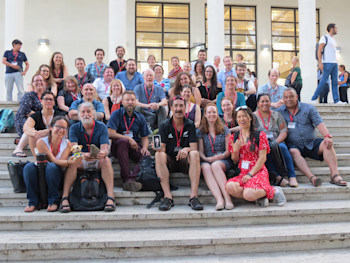
Cities on Volcanoes - exchanging ideas and experiences between ‘volcano cities’
Some of our volcano team have just returned from the 10th Cities on Volcanoes conference in Italy, which involves scientists, First Nations people, local government and emergency services from across the world learning from each others’ experience.
The Cities on Volcanoes (COV) conference started in Rome in 1989 and was followed in 2001 with COV2 in Auckland. Since then it has been held in Hawaii, Ecuador, Japan, Canary Islands (Spain), Mexico, Indonesia and Chile, before returning to Italy for the 10th meeting. Sponsored by the Cities and Volcanoes Commission of IAVCEI, the aim is to link the volcanology community, emergency managers and responding agencies and to promote multi-disciplinary applied research to the problems volcanoes bring to communities and cities.
New Zealand was well represented at the conference this year, with researchers from the GeoNet project, GNS Science, New Zealand universities, Iwi, DOC, and Auckland and Bay of Plenty Civil Defence Emergency Management Groups participating. As always, the Kiwi team punched above their weight and presented across all the science themes: volcano dynamics and hazards, assessing and managing volcanic risk, and enhancing preparedness and resilience.
The meeting was hosted at Campi Flegrei, Napoli, within a community that’s highly exposed to volcanic risk. In the Neapolitan area there are two active explosive volcanoes, Vesuvio (Vesuvius) and Campi Flegrei. The city of Napoli is home to more than three million people and is one of the best examples of a city living with a volcano problem. The western part of the city lies within the still-active and restless Campi Flegrei caldera, while its eastern periphery is at the foot of Vesuvio, the volcano famous for burying the Roman cities of Pompeii and Herculaneum in 79 AD. The two volcanoes, separated by only a few kilometres, are very different. Vesuvio, which last erupted in 1944, is a cone volcano much like Taranaki and at 1281m high it dominates the sky line. Campi Flegrei, which last erupted in 1538, is a more complex caldera system, like the Rotorua-Taupo area, and is made up of many hills that are remnants of volcanoes or depressions that are young craters.
Caldera unrest is one of the big talking points in volcanology. Calderas are large, geologically-active volcano systems that do not erupt very often. However, they do often show signs of unrest by partially waking up, rolling over and going back to sleep with no intention of erupting. The volcanic unrest can include earthquakes (some large enough to be damaging), ground deformation (often on the scale of a few metres) and upset hydrothermal systems generating steam-driven eruptions or other changes to hot springs, which can all affect communities. In the Campi Flegrei area there have been three large cycles of unrest, with one eruption in the last 2400 years. This involved ground deformation of up to 15m vertically, with parts of the area being submerged below sea level and others uplifted well above it, shallowing harbours, while earthquake damage has forced evacuations.
There are many lessons for New Zealand to learn about caldera unrest from the Campi Flegrei experience, particularly around communicating volcano science and gaining the trust of responding agencies and the community. Forming the Caldera Advisory Group, a collaboration between the Bay of Plenty and Waikato Civil Defence Emergency Management Groups, GNS Science and the Ministry of Civil Defence & Emergency Management is clearly a move in the right direction for New Zealand, as is the underpinning research being done as part of the ECLIPSE project.
The next Cities on Volcanoes (COV11) conference will be held in Greece in 2020.



